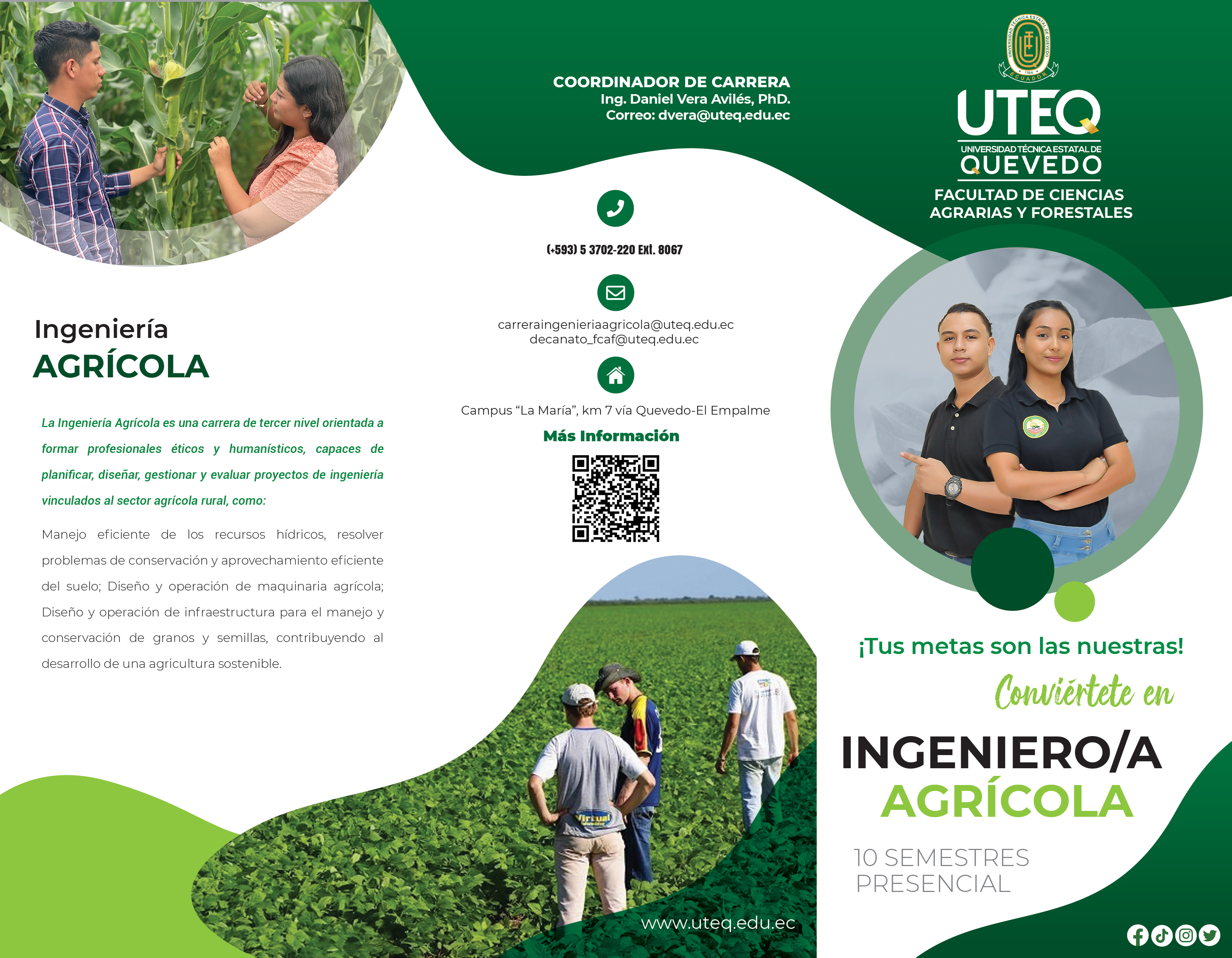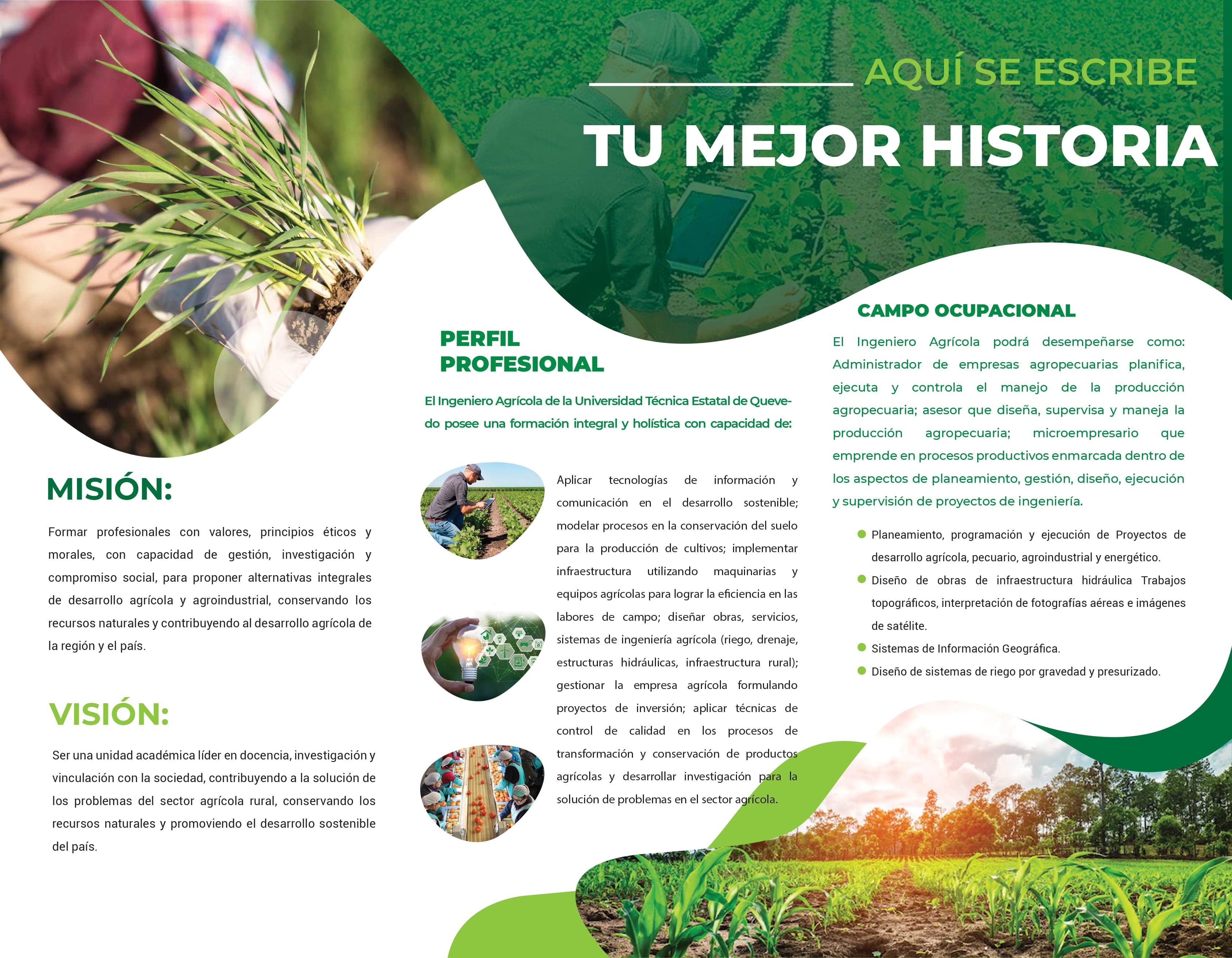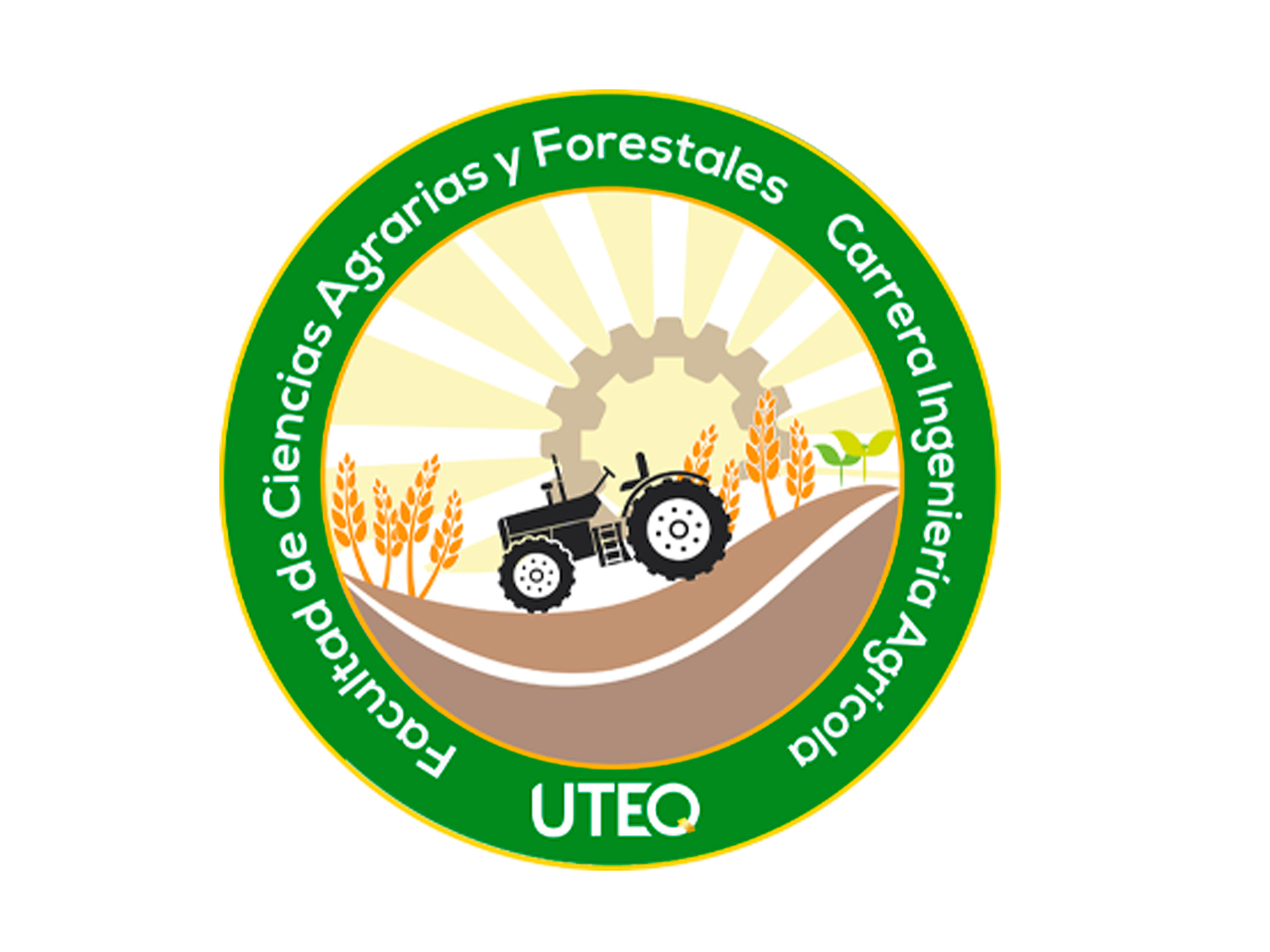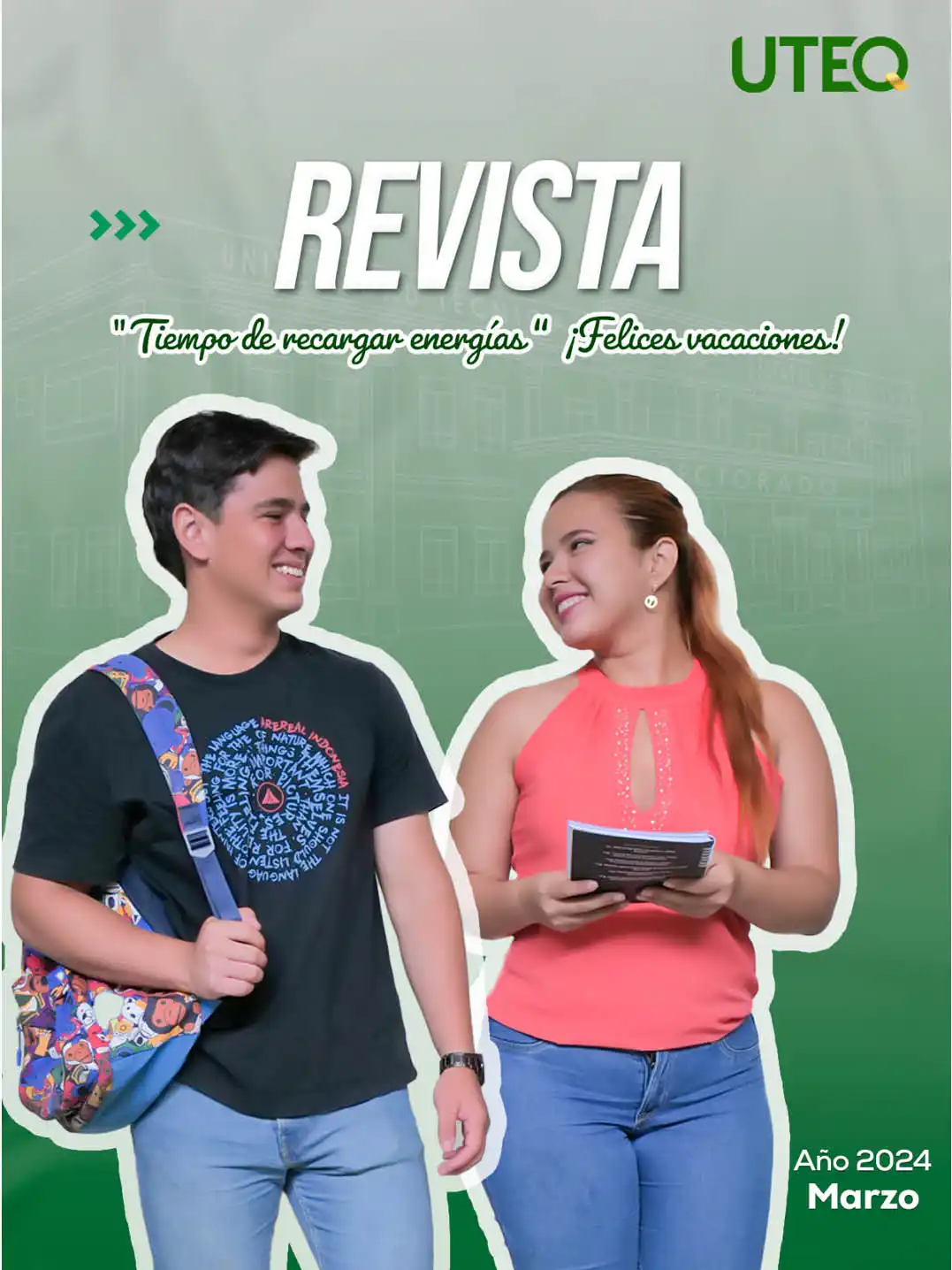Agricultural Engineering
Title of the course
Agricultural Engineering
CES Approval
06 mayo 2020
RPC-SO-12-NO.226-2020
Academic Degree
Agricultural Engineer
Modality
Face-to-face
Duration
10 semesters
Vision
To be a leading academic unit in teaching, research and links with society, contributing to the solution of problems in the rural agricultural sector, conserving natural resources and promoting the sustainable development of the country.
Mission
To train professionals with values, ethical and moral principles, with management, research and social commitment skills, in order to propose integral alternatives for agricultural and agro-industrial development, conserving natural resources and contributing to the agricultural development of the region and the country.
The Agricultural Engineer of the State Technical University of Quevedo has a comprehensive and holistic training with the ability to: Apply information and communication technologies in sustainable development; model processes in soil conservation for crop production; implement infrastructure using agricultural machinery and equipment to achieve efficiency in field work; design works, services, agricultural engineering systems (irrigation, drainage, hydraulic structures, rural infrastructure); manage the agricultural enterprise by formulating investment projects; master information to prevent and evaluate risks in agricultural engineering works; apply quality control techniques in the processes of transformation and conservation of agricultural products and develop research for the solution of problems in the agricultural sector.
Occupational field
The Agricultural Engineer will be able to work as: Administrator of agricultural companies, plans, executes and controls the management of agricultural production; advisor who designs, supervises and manages agricultural production; micro-entrepreneur who undertakes productive processes framed within the aspects of planning, management, design, execution and supervision of engineering projects, in the management and rational use of water resources, the planning and construction of infrastructure works and agricultural and agro-industrial mechanisation.
- Planning, programming and execution of agricultural, livestock, agro-industrial and energy development projects.
- Design of hydraulic infrastructure works Topographical work, interpretation of aerial photographs and satellite images.
- Geographic Information Systems.
- Hydrological, hydrogeological, drainage and groundwater exploitation studies.
- Design of gravity and pressurised irrigation systems.
- Inventory, operation and maintenance of irrigation and drainage infrastructure.
- Soil conservation and integrated watershed management.
- Environmental impact assessment.
- Regional planning and development.
- Soil mechanics studies.
- Design, construction and supervision of social and productive infrastructure works: roads, housing, water and sewage systems.
- Operation, maintenance, evaluation and repair of agricultural and agro-industrial machinery.
- Selection and management of agricultural machinery.
- Projects for the use of conventional and non-conventional energies.
- Wastewater treatment.
- Extension and training in the management of water resources, agricultural mechanisation and development works.
Within a period of less than 72 hours after the absence, the student must justify the absence through their academic management system account (SGA) where they must attach a PDF of the medical certificate validated by the UBU (University Welfare Unit) in the event that the absence was due to illness; or attach the death certificate of the family member in the case of domestic calamity.
Access to a third registration is limited to only three possibilities:
- Catastrophic illness or traumatic brain injury
- If you have had a high-risk pregnancy
- If it is the last subject to complete the curriculum.
In the case of a and b, the student must attach the appropriate medical support that demonstrates that the student has been through these situations, and this documentation must also be validated by the UBU.
In general, the SGA blocks students who have stopped studying the last academic period, so the student must request by means of a signed request in pdf to the career mail the unblocking of their SGA account to be able to access the new enrolment period.
When a change of HEI (Higher Education Institution) is made, it is not possible to validate all the learning units approved in the HEI of origin, so as the student approves the prerequisites of the current curriculum, he/she can request through the Career Coordination Office that the learning units that were not validated at the time of the transfer of HEI be validated by validation. For this analysis, it must be considered that the subject to be validated must have 80% similarity in its minimum learning contents, as well as in the number of credits and hours.
- Approach the Career Coordination Office where you intend to change, to request requirements.
- This must be done 60 days before the start of enrolment in the period you wish to join.
- The documentation to be gathered from the IES of origin must be validated by the Career Coordination.
- Take into account the score of your Senescyt exam, if it reaches or exceeds the score of the application where you wish to transfer.
- Application for a place addressed to the Dean of the Faculty, for the degree course you wish to change to.
- Certified academic record (hours and credits) of the degree course you are coming from.
- Certified transcript of records.
- Certificate of not having completed a third registration.
- Certificate of the SENESCYT exam.
- Certificate of not having been sanctioned for acts of indiscipline in the corresponding IES.
- Certified links by the Career Coordination from where they come from.
- Application for a place addressed to the Dean of the Faculty, for the degree course where you wish to change.
- Certified academic record (hours and credits) of the degree course you are coming from.
- Certified transcript of records.
- Certificate of not having completed a third registration.
- Certificate of the SENESCYT exam.
- Certificate of not having been sanctioned for acts of indiscipline in the corresponding IES.
- Certified links by the Career Coordination from where they come from.
Consideration should be given to whether there is an inter-institutional agreement between the two HEIs and if so, the same requirements apply.
- Application for a place addressed to the Dean of the Faculty, for the degree course where you wish to change.
- Certified academic transcript (hours and credits) of the degree course from which you are coming.
- Certified transcript of records.
- Certificate of not having completed a third registration.
- Certificate of the SENESCYT exam.
- Certificate of not having been sanctioned for acts of indiscipline in the corresponding IES.
- Certified links by the Career Coordination from where they come from.
In order to access financial aid, the application period must be in force in the Academic Management System (SGA), where each student can select the type of financial aid of interest and upload the requested documents if they meet the requirements. Approximately on 1 August each year, enrolled students receive notifications through the SGA through which those who meet the established requirements can apply. The types of financial aid available are:
- For Academic Excellence
- For Limited Economy
- For Ethnic Groups, Peoples and Nationalities
- For Disability
- For Culture and Sport
- By Emergency Covid-19
The deadlines are published in the call for applications (one per year). Additionally, the student must have been a regular student during the financial aid validation period, which corresponds to the academic year prior to the call for applications. It is suggested that you review the requirements for each type of grant and apply for the one in which you think you have the best chance of being a beneficiary.





